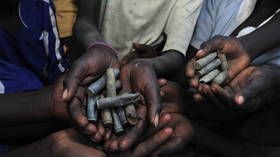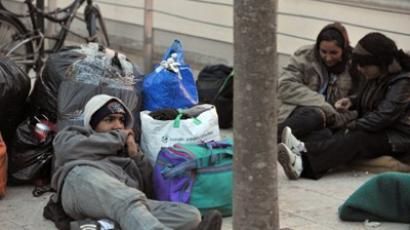Dimmed excellence: 'American advantages serve those who can afford them'
The concept of “American exceptionalism,” which traditionally places the US ahead of the rest of the industrialized world, should be dramatically reconsidered as the health and wellbeing of US citizens are sacrificed in the name of profit.
This is according to Dr. Howard Steven Friedman, a leading UN health economist and statistician, and author of the book ‘The Measure of a Nation.’Friedman says that America – birthplace of the ‘American Dream’ and once an exceptional nation of freedom, equality, opportunity and high living standards – has long since lost many of these qualities. The richest one-third of the American population now rules the lives of the rest, he argues.Howard Friedman: I was initiated by a conversation with my cousin when we were discussing the Patient Protection and Affordable Care Act. He had been defending the current system in America, saying that it is the best in the world. I asked him, “how do you know that?” and his response was, “I have no idea.”Just a couple of days afterwards I was doing some of my work at the UN and I was looking at some human development reports and it dawned on me that the data to compare the US with other wealthy countries is readily available. You can look at it, you can see how we’re doing. And from there you can identify if we’re doing better or worse. And, if we’re not doing that well, what are the lessons we can learn from other countries?So when you do the comparison, what you find is the US is not doing that well. On health, safety, democracy and equality we’ve got some of the lowest levels. For education we’re roughly in the middle. One of the disappointing factors is, we used to be one of the best in most of these categories. .RT: In the case of social mobility, you’ve found out that America is not the land of opportunity it promises to be. Countries like Canada and Germany rank better than America. What exactly did you find out?HF: This is one of the most surprising results in the book. I grew up believing in the American Dream: Work as hard as you can, and you can go anywhere. And it is true, some people really do move up from poor classes to the wealthiest. But the chances of moving are much lower than in other wealthy countries.When one is born in the poorest part of the US, not just geographically, but in that segment of the population, the chances of them just moving out of that group are almost 50 per cent. That is, almost 50 per cent of the people are going to stay there.And the rags-to-richest story: Going from the poorest to the richest group is lower in the US than the other wealthy countries for which there is data. That shocked me.
No more basis for American exceptionalism
RT: What happened to the so-called America’s exceptionalism the country prides itself on?HF: American exceptionalism is really a tough concept. Because at some level there is almost a faith. It is a denial of facts and just looking at this idea from almost a religious point of view. And I find American exceptionalism as an argument to look at what I call competitive intelligence for America as a problem. Because people would say, “Well, the US is exceptional, you cannot compare us.” And I view that as just a self-defense mechanism, we’re just trying to maintain blissful ignorance.RT: On the other hand, the frightening reality according to your facts is how America’s level of inequality compares to Europe and other wealthy nations. HF: When you talk about the income inequality there are really two measures: There is what’s called a pre-adjustment and a post-adjustment. The pre-adjustment is a raw income you earned. The post-adjustment is after you paid the taxes and the government has provided supports – welfare, social security, etc. As it turns out the US has the highest level of income inequality, both pre- and post-adjustment. Why that is true is an interesting question. This level of inequality has grown much larger over time, as we’ve seen changes in the pay structure, the weakening of the [trade] unions, degradation of the minimum wage in the US as compared to other countries. So a lot of factors are affecting this pre-tax income inequality.But for the post-tax income inequality it is all about changes in our tax laws. There was a time when we really had very progressive tax system. Now, with capital gains been taxed much lower than regular income, with hedge fund managers earning millions, sometimes billions and paying 15 per cent… Look, for example, at Mitt Romney. The man earned many millions last year, yet paid a tax rate probably half of what you paid.
America’s 'winner-take-all' democracy
RT: How does America’s democracy compare to other nations?HF: That’s another one that is problematic. There was a time when it was fair to say the US was a leader. We came up with the Constitution, the Declaration of Independence, the whole idea of the modern representative government. But now it slid down. If you look at our turnover of voters, it is one of the lowest in any wealthy country. At the same time, our two-party system with a winner-take-all single seat election is unusual, most countries don’t do that. The reason why is this type of election ends up alienating a lot of voters, while most countries use proportionate representation…RT: Does any other wealthy nation allow private money to fund and fuel presidential elections the way the US does?HF: I haven’t specifically looked into that, but I cannot underestimate the impact of money on the American political system. Some interesting analysis by political scientists shows that the top third of the economic class have a very strong voice in government; people in the middle third have a weak voice; whereas people in the bottom third have no measurable influence. That type of information is powerful. If you look at the politics of many countries around the world, it is shocking to think that this could ever be true. The poorest third in those countries still have a powerful voice. That is a real challenge to American democracy. Just to make sure that we really earn a world of ‘one person, one vote’ instead of ‘dollar equals vote.’
'There are groups in America that don't need change'
RT: Are you hopeful that the candidates currently running for president could make any reforms or change that would elevate America to a better global position?HF: Right now I’m not truly optimistic. The reason why is they are hindered by a few things. The fact preventing the US from really moving forward is the one that most Americans are just unaware of how we’re doing. They are not aware of this situation. They think we’re doing much better than we are.The second [reason] is complacency. We’re relatively comfortable in our world situation. People aren’t dying on the streets, so there is not much passion to see change.The third one – which is really important – is that our democratic process really resists change. If you look at our structure of government – it’s basically designed not to move much. And it unfortunately suppresses the voices of those American who could really benefit from change.The last factor is there are groups in America who’ve benefited greatly from some of the issues that we have discussed; they prevent us from having great health, education, safety, democracy and equality. These groups who benefit, they are going to do their best to protect their profit. That’s the free market.RT: You mean corporations?HF: It’s not just corporations, though. For instance, the two-party system in America: That’s not a system that enables lots of Americans to have their voice heard. But at the same time, those two parties will defend the two-party system.So, corporations are certainly one aspect, but even the groups benefiting from our political system will defend the current political system.I’ll give you a great example. For the presidential debates, there is a committee that was brought in that said you have to have at least 15 per cent polling before a certain date to participate. The only reason why that was put in place at that high level was to prevent third parties from being on that stage with candidates Romney and Obama.
Peculiarities of America's global leadership
RT: The American government always positioned itself as a global leader in human rights and justice, however you say the US is the least peaceful nation. What exactly do you mean by that?HF: What we looked at was crime rates, incarceration rates – those were internal measures of safety. At the same time I always looked at the external: Our military spending and our tendency to have external wars. As you look at internal measurers of violence and crime and external measures of safety and war interaction, what you see is our incarceration rates are multiple times higher than any other wealthy nation. At the same time, our murder rate is much higher.Most Americans don’t realize that our policies are completely different from any other country. In external military interaction the US plays a very different role than other countries. The other countries I compare the US with in my book – some European states, Australia, Canada and Japan – they receive a kind of protection from the US, which means the actions of the US do impact the actions of other countries. The US is spending far more on military, making itself more armed to protect many of these countries. It lets the other countries spend less. That’s exactly what you see in these dynamics.RT: In what areas does the US find itself in leading positions among other wealthy nations?HF: There are a few areas where we excel. We have some of the best colleges in the world. Our graduates are outstanding, some of the strongest in the world. Our hospitals, our technology overall is world class… Students come here in order to learn, and hopefully we can keep opportunities for them not just to arrive, but to stay. Our technology that allows us to innovate and to create some great companies – that still exists. And our entrepreneurship, the government rules that allow us to create new companies – they are really outstanding.RT: US universities and hospitals may be excellent, but the student debt bubble is about one trillion dollars, and roughly 50 million people are living without healthcare. How are Americans benefiting from the nation’s excellence?HF: One of the things that is true about the US is we have the extremes of excellence, and a public system that seems to drift behind. If you take education, our undergraduate schools are some of the best in the world, and they are extremely expensive. That’s a challenge. It is only accessible to a certain percentage of the population. But for those who can access them, they are excellent. Our graduate schools – the same thing.Our medical system, for those who can afford it, we really do have a great health system. Our public health system is well behind.














